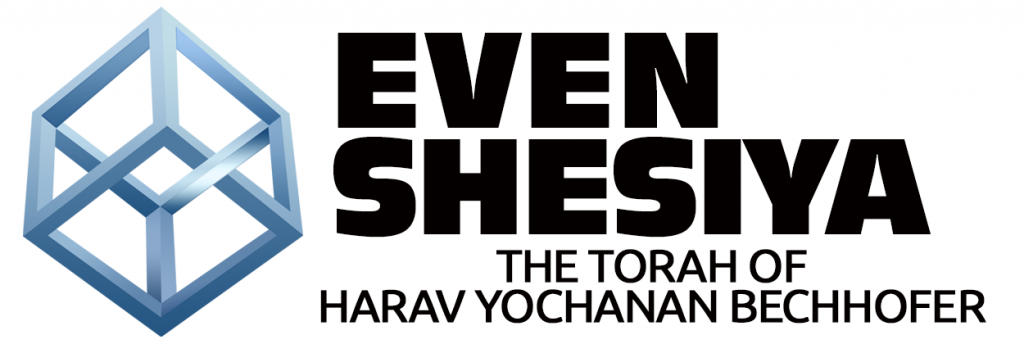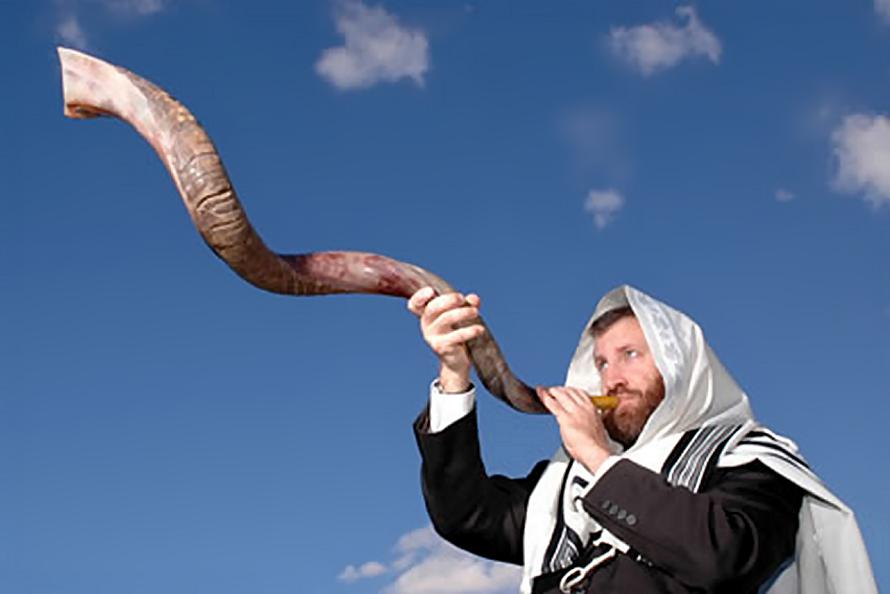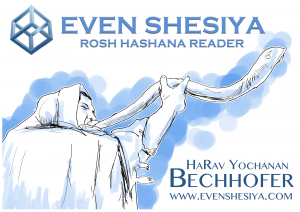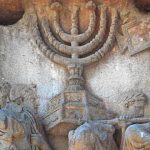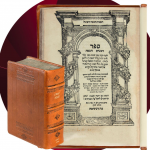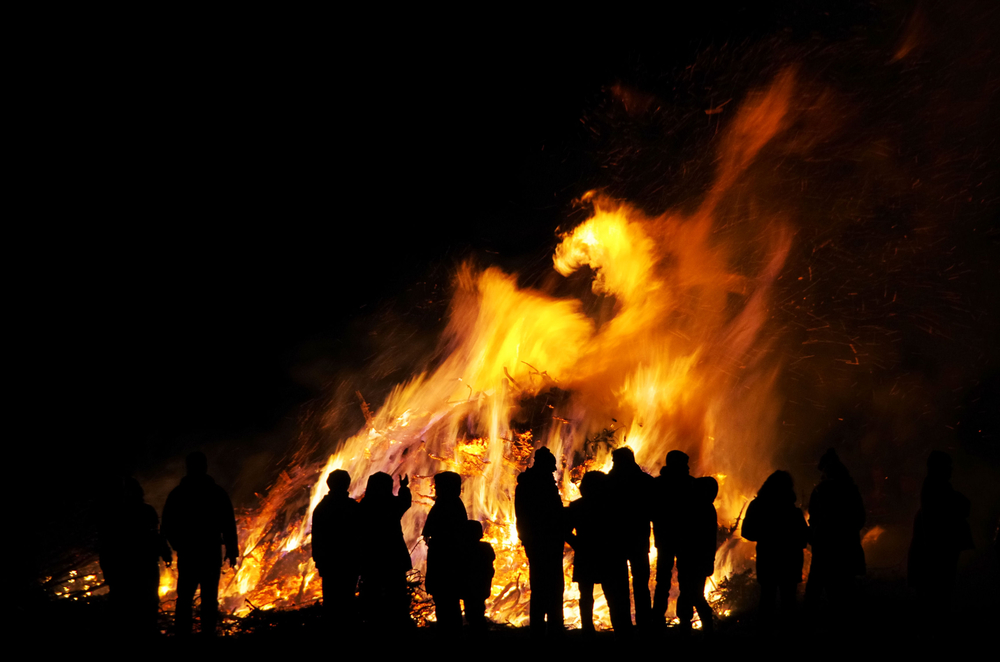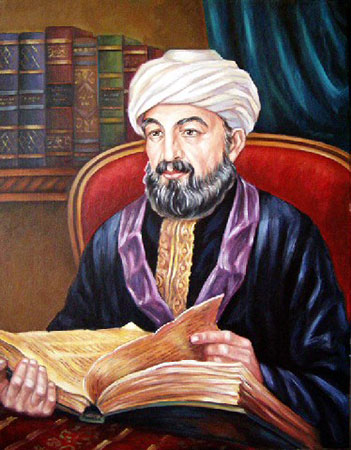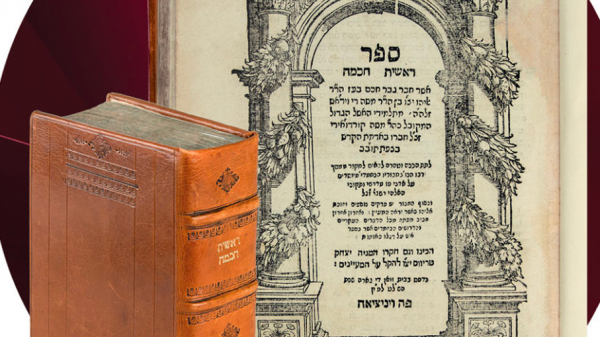Click here to download PDF (for single sided printers)
Click here to download PDF (for double sided printers)
FIRST NIGHT OF ROSH HASHANA
מעריב
The ספר החיים Book of the Living
The judgment on Rosh HaShanah is multi-leveled. First and foremost, we are judged on whether we are צדיקים– righteous, orרשעים -wicked. To be declared a Tzaddik is to be inscribed in the Sefer HaChaim – the book of the living, “Tzaddikim even in their death are called alive” (Berachos 18). To be declared a Rasha-an evil person, is to be inscribed in the ספר מתים-the of the dead, as “Reshaim even in their lifetime are called dead” (ibid). Theבינונים, the ones who are in the middle do not have their final judgment until Yom Kippur. It is for the sake of our status as Tzaddikim that we are praying for in the supplementary lines in the first two Brachos of Shmona Esrei. We pray, זכרנו לחיים מלך חפץ בחיים וכתבנו בספר החיים למענך אלוקים חיים ‘remember us for life, King who wishes to grant life, and inscribe us in the book of life for Your sake, Lord of life’. So also, in the second Bracha of Shmona Esrei,מי כמוך אב הרחמים זוכר יצוריו לחיים ברחמים ‘who is like you, father of life, who remembers His creation for life with His mercy’.
Additional notes in the Book of the Living
However, as far as a person’s situation during his lifetime on earth, the matters are a much more complex. A person can have a life of abundance because he is a Tzaddik, as that’s what he deserves, or just the opposite, because he is a Tzaddik (but no one is perfect) he can have a hard life in this world for the purpose of cleansing the few sins that he may have so his Olam Haba should be undiminished. The same is true for the evil. An evil person may have a miserable life because that’s exactly what he deserves because he is evil. However, precisely for the same reason, that he is evil, it is possible that he would have a great life on earth because he is getting the few Mitzvos that he has paid off in this world, and to distract him from doing Teshuva, so he has no Olam Haba to look forward to. This is the significance of the requests added to the final Brachos of Shmona Esrei: Even after being inscribed in the book of living, which means we made the grade to be tzaddikim, we further request to be inscribed for a good life in this world. That’s why we add וכתוב לחיים טובים כל בני בריתך ‘and inscribe for Good Life all the children of your covenant’. And in a more detailed way in the final Bracha of Shmona Esrei,בספר חיים ברכה ושלום ופרנסה טובה וגזירות טובות וכו, ‘in the book of life, blessing, peace, good livelihood and good decrees etc.’. (Ramchal; Maamar HaChochma)
Ata Kadosh/”Malchiyos” – Revealing Hashem’s Kingdom
Rosh HaShanah has multiple themes. There is declaring Hashem as King of the world; there is the Remembrance and Judgment; and then there is the idea of a new year for a renewed world. These are not disjointed ideas. They are all integrally interconnected.Renewed Existence
How do we define ‘existence’? What is ‘to exist’? ‘Existence’ is Hashem’s kingdom and ‘to exist’ is to be in His Kingdom. In the books of Kabbalah, we are taught that the word זאת (“This”) which is a generic term for any entity is a synonym for the attribute of מלכות Kingdom. A renewal of Hashem’s kingdom is a renewal of existence. His kingdom is existence itself.
Optimal Existence
In the bracha of “Ata Kadosh” there is great deal of addition about Hashem’s Majesty. We live in a world of Good vs Evil, which in humanity translates as the Jewish people who are Hashem’s nation vs the nations of the world. For the world to be in the optimal state of “Tikun”-the good should reign supreme and all evil should be totally subjugated under the good. In humanity that means that the Jewish people rule, and all the other nations are subjugated under them. This state of optimal existence is good for everybody. Holiness and all goodness shines first and foremost on the Jewish people and since the nations of the world are subjugated to them, they will also be able to absorb Holiness and goodness from the Jewish people and this brings a general state of blessing to the whole world! However, if the other nations rebel against the Jewish people’s supremacy, the Jewish people lose, but so do the nations of the world! The Jewish people were designated by Divine Design to be the only vessel and vehicle for “Holiness” and “Blessing” and it can only be shared by contact with Jewish people through being subservient to them!
The Kingdom emerges
On Rosh Hashana Hashem openly administers the cosmos as King over Reality and therefore it is the time to pray that He should reveal His Kingdom fully. The essence of all the additional prayers revolve around this idea that Hashem is King on this day, so we pray that His Kingdom should expand to full revelation and with that fix the whole world! The first outcome of the revelation of Hashem’s Kingdom is that people would feel fear of Hashem and that’s why we pray תן פחדך על כל מעשיך “Place your awe upon all your creations……”
One world under One Nation under the One and Only Absolute Being
Hashem is the one and only Supreme being and ruler, and this revelation of His being the one and only Absolute Reality is only revealed through the Jewish people and that’s why they’re called גוי אחד or אומה יחידה The One Nation: because they are the vessel to reveal this idea to the world. The other nations of the world by their very nature are many and separate, each with their own deity. The only way that they could unite under Hashem and accept Him as the one and only Supreme Being is by subjugating themselves to the Jewish people who carry the revelation of Hashem’s One and Only Supremacy. Through their subjugating themselves to Jewish people they join the grand revelation of אחד “ONE” and that’s why we pray ויעשו כולם אגודה אחת לעשות רצונך בלבב שלם “let all make one bond to do your will with a United heart”
סימנא מילתא
The source for eating Simanim (each community with its traditions) is already in the Talmud. It is not in Maseches Rosh Hashanah but interestingly enough, it is in connection with the custom of how Jewish kings were anointed. The Gemara says (Horiyos 12; Krisus 5) that kings are to be anointed at a flowing spring that it should be a סימן -sign that “his kingdom should flow fourth“, meaning to say expand and be continuous with a vital connection to the source. The Gemara concludes from this that סימנא מילתא– signs have meaning and therefore, we should eat the simanim for all the good things that we pray for on Rosh HaShanah. There is an inherent connection between the prime example of anointing a king and the application of eating the simanim on Rosh HaShanah, as Rosh HaShanah also is a day of declaring Hashem our king and our allegiance to Him. The moment of anointment is when the king is coronated and everyone knows it and is excited about it. The problem that could arise as time goes by, and as the kingdom expands to faraway lands out of sight of the capital, is that people forget about the king – to the point that the kingdom may dissolve. That’s why they made the sign that the kingdom should be continuous and ever-expanding, but always with a sense of flowing from the source. The מלכות –kingdom should never lose sight of the כתר– crown in all the time that passes and all the expansion that unfolds. It is no coincidence that that is actually the function of aסימן in halacha. The lost object can be returned to its rightful owner if it has “simanim”- clear distinctive marks. An unidentified body can be identified based on” simanim” that are marks that point to the identity. On Rosh HaShanah all of reality is reset and starts over by coronating Hashem as our king and existence renewed as Hashem’s kingdom. Rosh Hashana is the כתר crown or nucleus of the whole year. The new year is a new chapter of Hashem’s kingdom destined to unfold with abundance from the power of Rosh HaShanah and without ever losing sight of Hashem being our king. Within all the abundance, we must remain mindful of our King and maintain full allegiance to Him. Therefore, we eat, which is to internalize, simanim – identification marks, to keep us connected to the power of Rosh HaShanah, which is the coronation of Hashem as king, throughout the year. The application truly mirrors the prime example. The simanim that we eat Rosh HaShanah night are internalized identification marks to stay connected to our king, so as the whole year has a sense of Hashem’s kingdom continuously flowing fourth.
ROSH HASHANA FIRST DAY
יום הדין – דינא קשיא
The Jewish perspective on Hashem’s Law and Judgement
Din or Not?
There’s an inner contradiction in Rosh Hashanah being a day of judgement. We’re being judged and seemingly a judge would not want loopholes, as he wants to enforce the law. Why is it that Hashem actually commands us to blow shofar Which, Chazal say, quiets the Satan from prosecuting and even makes Hashem “get up from the Throne of judgement and sit on the Throne of Mercy and convert the judgement to mercy”. Does Hashem want to judge or not? If He doesn’t want to judge, let Him not judge at all! Why is there this seemingly charade of judging but then commanding us to use the shofar to annul the judgment and move it to Mercy? The Midrash in parshas Emor actually says it as follows: “… just like shofar you blow in one end and the Sound comes out the other end so also Hashem gets up from the Throne of judgment and sits on the Throne of mercy and converts the Judgment into Mercy” The metaphor and the application are not congruent. The blowing of the shofar is a natural Continuum, the air that goes in one side of the shofar will come out the other side. Whereas getting up from the Throne of judgement and sitting on the Throne of mercy and converting the Judgment into Mercy is switching sides! How do we understand how the metaphor fits the application?
Din & Rachamim- Plan & Action
Chazal tell us Hashem contemplated creating the world with “Din”-Law, but he saw that it would not last, so he added the attribute of mercy and created it. Hashem doesn’t make mistakes and Hashem knows the future before it ever happens. How can Hashem contemplate one way and then decide that it’s not a good plan? With a more careful reading of this chazal we observe two important points: First – Hashem never changed his mind about “Din” but rather added Mercy! Second – There is a definite progression from thought to physical actuality. The world was created in thought with “Din” and in physical actuality with Mercy. Why?
Firm & Flexible
The creative process starts with design and plans. What are design and plans? Laws! You make decisions as to what it should look like, how big, how small, what shape, what color, what properties, what function, etc. With those decisions you are ruling out (outlawing) infinite other possibilities. Another word for this is “Din”- law. Hashem contemplating the world with “Din” means exactly that! “Din” legislates, designs, and gives structure. However physical reality being what it is, as “the flesh is weak”, will never fully live up to plan 100% all the time and for that we must add flexibility. That’s what it means “He saw it will not endure…”-the weakness of the material will not be able to be fully in accordance with the plan, so He added Mercy- which is flexibility and created it in actuality. It is not realistic to have a physical world, with all the limitations of physicality, conform a hundred percent of the time to the optimal plan. Such a world cannot exist in physical reality. You must add flexibility. That’s what it means he added mercy and created it.
Tishrei vs Nisan
Everyone agrees that the world is being renewed and judged on Rosh HaShanah, but it is that historically when the world was first created? It is actually a machlokes between Rabbi Eliezer and Rabbi Yehoshua, whether the world was created in Tishrei (meaning to say creation finalized on the first of Tishrei with the creation of Adam) or whether the world was created in Nisan (creation was finished on the first of Nisan with the creation of Adam). Tosfos (Rosh Hashana 27A D”H K’man) points out that Rav Elazar Hakalir in the Piyutim that he wrote for the month of Tishrei runs with the opinion of Rabbi Eliezer that the world was created in Tishrei. However, in his Piyutim to the month of Nisan his themes run with the opinion of Rabbi Yehoshua that the world was created in Nisan. How can he grab on to both opposing sides of the argument? Rabbeinu Tam says that both Rebbe Eliezer and Rebbe Yehoshua are correct. In Tishrei Hashem contemplated and planned out the creation of the world and in Nisan He created it in a physical actuality. This remains the pattern forever after on Tishrei Hashem plans out the whole year and writes a program in the books of life and death of what is to be. After Tishrei the world begins to shut down and go into hibernation for the winter where the remnants of last year are removed and the rainfall that comes builds up the potential which emerges in full actuality in the spring, which is ushered in by Nisan, Chodesh Haaviv, the month of the spring and blooming. Tishrei is the Conception of the new year and Nisan is the Birth. This is the secret as to why our barren Matriarchs conceived on Rosh Hashana, it’s the day of conception for everything. This is the secret why Tishrei remains the month of judgment as it IS the month where the world is designed for the form that it is to take in the new year. Nisan is the month of mercy which is to add that flexibility necessary to ensure that the world endures and successfully makes the transition from potential to actual.
Din – the source of the Natural laws
Another function of “Din” is to make something firm and immutable. If you want to make something, you want to build it to last. Why should it last? Why does it have the lifespan that it has? Because it’s built on certain natural laws: the laws of biology, chemistry, and physics. These laws are firm because they are made by “Din”. Mercy doesn’t force anything. Just the opposite, it adds flexibility! For endurance you need firm, not flexible. This is another reason why the creative process has to start with “Din”: to give a solid foundation! After there’s a solid foundation of laws, flexibility could be added, but nothing can be built on flexibility! Flexibility is not a firm foundation….
Earning & Deserving
These ideas allow us to have a much deeper appreciation of what the Ramchal explains in the “Derech Hashem” (Section 1 chapter 2) that Hashem created the world to bestow goodness, but the only real goodness is an earned goodness – otherwise it is ‘bread of shame’. The Ramchal explains that the earned goodness makes one really truly the master of that good because it is his. In Mercy there’s no such thing as ‘mine’ or ‘yours’. Something belonging to me is my ‘right’! ‘Rights’ are built on law- “Din”. This is not just a psychological or legal difference but rather the Perfection that is earned through “Din” is firm! That’s why the Perfection that we earn with our Mitzvahs gives us ‘Olam Haba’ and makes us eternal -Because “Din” is firm and everlasting. If this would have been a gift, and nothing that we rightfully earned, it would not be firm, and there’s no reason why it must be (=Din) something that must make us Eternal.
Din – cleansing agent
Another aspect of “Din” is that although it punishes us for our wrongdoings, Hashem’s punishment is not like Earthly punishment. Earthly punishment is an imposed idea human being made it up and it is purely punitive. Hashem’s Justice comes from the very same “Din” that created the world! It is actually to realign things, cut them back into shape, but more than that it has the special quality of cleaning and repairing the damage. Hashem’s judgment gives “Kaparah” and “Tahara”- atonement and purification and it is actually the best thing for the sinner! It is his medicine and cure, so he can be cleaned up and have a fair chance of attaining the immortality that could be earned through mitzvahs.
Din – the Parameters of the Kingdom
The judgment is to determine what is within the boundaries of the kingdom and runs in full accordance with Hashem’s will and what is outside of those boundaries and violates Hashem’s will to be determined to be in accordance with Hashem’s kingdom that IS life; to be in violation of Hashem’s kingdom that is death because Hashem’s kingdom is the source of life. To be fully connected to Hashem’s kingdom is to have full undisrupted connection to the lifeforce and that brings abundance of health and wealth. To be barely connected leads a minimal lifeline which could allow for sickness, poverty or any other lack. The judgment is for the sake of making this necessary determination at the time that the kingdom which is existence itself is being renewed.
Din becomes Rachamim – Naturally
Rosh Hashanah is not about dying or being threatened in any way. It’s about being legislated to live with the power of the law! The power of the law itself yearns and wants to be combined with Mercy to bring the new world to full fruition. That’s what the Midrash means: “….. I will be like the shofar, you blow in one end and the sound comes out the other end, so also I get up from the Throne of Din and sit on the Throne of Mercy…etc.” – it’s not switching sides, it’s a Continuum –moving the renewed existence from potential towards actuality.
Getting on the side of the Law
Chazal point out: the nations of the world whenever they have to go to court they go in hungry, shabby, and unshaven, as they are deathly nervous. The Jewish people go into court with Hashem on Rosh Hashanah shaved, bathed, and in their best clothes because we understand that Hashem’s attribute of judgment is for the sake of the world – to renew it from the plan downwards and to give it a firm existence and when necessary, to clean it up so it should be stabilized. The Goyim understand “Din” as an avenging force and that’s why they are scared of it – and they interact with it on that basis, they try to flare it up against the Jewish people. We understand that Hashem’s judgment is a renewal of existence – not anti-existence. That’s why the new year starts on this day of judgment. It is just like the beginning of the world itself, the world started with contemplating creating the world with “Din” – and that’s what happens on Rosh Hashanah!
No Time for ‘Sorry’
With this we could understand why on Rosh Hashanah, a day of judgement we don’t beg for mercy. Begging for mercy we do subsequently on Yom Kippur. We’re on trial today, so why are we not begging for mercy today? Rosh Hashanah is the day to reconcile ourselves with what Hashem’s judgement is. We accept Him as King, and we accept His Laws as life itself. Once we are reconciled with His being King and that His law is life then we have a healthy foundation with which to say to say ‘sorry’. If we set ourselves up in an oppositional position to his law, like the nations of the world, then we have no right to say ‘sorry’, and the law would demand our removal from reality – because we would be “Anti-reality”! The service of Rosh Hashanah is to accept Hashem as King, and to accept His Law as the rock-hard foundation of life and on that healthy basis we could improve our relationship with Him and get forgiveness.
The Torah Reading
וה’ פקד את שרה
On the first day, we learn about the miracle of Sarah becoming pregnant with Yitzchak. In truth, the Gemara says that Rosh HaShanah was the day of conception for several of our matriarchs that were barren. Why Rosh Hashana is the day of conception was explained above (see entry “Tishrei vs Nissan”). However, the prime example is Yitzchak, whose own attribute is the attribute of judgment, which is the attribute of the day. Yitzchak’s conception represents that man is being formed in full accordance with Hashem’s concept of ‘let us make man’. Yitzchak whose personal attribute is law surely makes the grade of fitting the bill of “man as he was meant to be” and his conception is fully in line with Hashem’s concept of ‘let us make man’. All this renews on Rosh HaShanah which is the day of conception for the whole year as we say in Musaf היום הרת עולם– Today is the conception of the world. This is a very hard grade to make. Are we really so virtuous that we can say that we are man, exactly the way Hashem envisioned at the time of creation, so much so that we merit to be recreated on this day? That is the bar of דינא קשיא – the strict judgement of the first day of Rosh Hashana
שופר
Moving Judgement to Mercy
Hashem commanded us to blow a Shofar to move the providence of the day to be mercy oriented as opposed to the fullest extent of the law and to silence the prosecutor (Satan) in particular. This movement from strict judgment to mercy is in itself justice. We rightfully earn responses from Hashem for whatever Mitzvos that we do. Hashem’s justice has decreed that there are actions that we can do that merit a response of converting strict law into mercy and getting a more lenient judgment. An example of this is what Chazal say ‘he who is willing to forego his anger and grudges against his fellow man, merits that Hashem measure for measure, will overlook all his evil deeds’ (Rosh Hashana17A). This is measure for measure, as he’s willing to forego what his fellow man did to him, so also Hashem is willing to forego on whatever sins this person did. What is rightfully earned is perfectly within the framework of law and justice. In this vein, the Mitzvah of blowing Shofar rightfully earns the response that Hashem converts his conduct of judgement to a conduct of mercy. The details of how this is accomplished is encoded in the very root elements of how reality is set up. Amongst the details are that the Shofar awakens the Avos to use their merit to awaken Divine mercy and to placate the attribute of judgment (Ramchal; Derech Hashem) as we will explain….
Tekiah – Shevarim /Teruah – Tekiah
The sequence of Shofar blasts parallels the sequence of the three Avos. The first Tekiah is parallel to our first patriarch Avraham Avinu whose attribute is Kindness. Kindness is like an unbroken sound; it knows no distinctions and gives to all equally. The middle-broken sounds of Shevarim/Teruah are parallel to our middle patriarch Yitzchak Avinu whose attribute is law. Law breaks up into distinctions to give each individual exactly what he deserves. Law also breaks up the evil that deserve it. The third and final Tekiah of the series is parallel to our third patriarch Yaakov Avinu whose attribute is mercy. The unbroken sound represents ‘kindness’ as we explained but the unique function of mercy is to temper “law” to add flexibility as we wrote above. The earlier generation from Adam until Avraham Avinu failed. The Avos are a restart of the world and therefore by no coincidence parallel the process of creation. Avraham Avinu represents Hashem’s pure Kindness and Will to bestow goodness. Yitzchak Avinu represents Hashem contemplating the creation with law. Yaakov Avinu represents Hashem adding mercy and creating the world in actuality. On Rosh Hashana the whole process of creation is renewed and hence the parallel merit of the Avos is awakened and activated, all with the power of the Shofar.
Yitzchak Yaakov & Eisov revisited
The Zohar (3: 98b) tells us that on Rosh Hashanah a famous biblical event renews itself: Yitzchak wants to give the Brachos to Eisov. Eisov wants to give his ‘cook dishes’ to Yitzchak whose attribute is “Din” representing that he wants to prosecute against the Jewish people – as the prosecutor ‘feeds’ the judge the charges he lays out against those he’s prosecuting. The shofar sound is the ‘voice of Yaakov’ who came in first and gave Yitzchak ‘his dishes’ which are all the wonderful prayers of the Jewish people and it starts with the shofar which represents the voice of Yaakov that called out to his father and got him to take his ‘dishes’ (prayers) and then there is tremendous joy and light in reality. On Rosh Hashanah there’s the great Cosmic race to activate the “Din” – whether the blessings of Yitzchak- the power of “Din” should be an avenging Force, which is the way the nations of the world perceive the “Din” and interact with it accordingly. Eisov represents the nations of the world and wants to harness “Din” as a destructive force – the way he misunderstands it. Yaakov represents the Jewish people who use the Shofar to get Yitzchak- “Din” to turn towards mercy (Yaakov) and us with love.
Awakening the Divine Omnipotence
Another response the Shofar gets is to awaken Hashem to use his Omnipotent Singular Dominion to subdue all evil like at the time of Matan Torah and like will be at the end of time which will be explained further in the entry on Shofaros.
מלכיות זכרונות שופרות
Malchiyos
“Malchiyos”- kingdom is revealing Hashem as the absolute King and power. This was explained above (see entry Ata Kadosh/Malchiyos)
Zichronos
“Zichronos” – be remembered by Hashem also refers to being judged. Besides the fact that Hashem remembers everything that we did in order to judge us on what we’ve done, it also means that we are have a place in Hashem’s memory. It shows He has his mind on us! Even though we’re taken to task for what we’ve done wrong, but the benefit of NOT being ignored by him and “having a place in His Thoughts” is well worth the price and guarantees our existence! As we explained above (see entry above on the Torah reading) the essence of the judgment upon us on Rosh HaShanah is whether we fit the standard that was envisioned and planned when Hashem said, ‘let us make man’? There is a more fundamental level: The most basic plan that Hashem had for reality is encoded in the very first word, ‘Bereishis’ which Rashi says is to be understood ‘for the sake of the first’, which are both the Torah and the Jewish people; the Jewish people are the indispensable vessel for the Torah. We have to “awaken that memory”, meaning to say that we the Jewish people, however faulted we may be, are that nation which is at the center and starting point of all of reality. To “be remembered” means, to find our inseverable root in Hashem’s thoughts and plans for reality. The nations of the world are also judged but without finding a place in Hashem’s plans and that’s why the Judgment ultimately obliterates them – they have no roots in Hashem’s plans for creation.
Shofaros
The way to execute this is with the power of Shofar. There was a shofar at the time of Matan Torah which was a “game changer”. The Jewish people got the sanctity of the Torah and “they saw their King”. That “Mighty sound of the Shofar” changed the world. Good became dominant in reality and evil was subdued. As we wrote above, when evil reigns that plays out in humanity with the Jewish people subjugated under the nations of the world, which is “Golus”. In the future, “Golus” ends with “The blowing of the Great shofar” as the good (the Jewish people) is liberated from evil (the nations of the world) and dominates. There remain all these years in between the two Shofars, especially as we lost the original level we were on by the giving of the Torah by making the golden calf. The Shofar of Matan Torah makes a comeback on Rosh Hashana. On Rosh Hashana we blow Shofar to reveal Hashem’s Kingdom and take another annual sized step towards optimizing existence.
Moving Destiny along, a year at a time
“The Wheel of Time” is actually being turned by the destiny to reveal Hashem’s singular reign “Hashem will be king over the entire earth and on that day He will be ONE and His name ONE” –that is the program driving Destiny and that’s what makes years pass. On Rosh Hashana, with a new year commencing we hit another landmark towards ”the Great Shofer sounding” and it’s time to blow Shofar to initiate the next roll of the Wheel of Time and Destiny towards the “Great Shofar”
תשליך
Tashlich
The essence of Tashlich is to say by a body of water the Pesukim from Micha (7:18-20) that parallel the 13 Middos HaRachamim. The reason behind this custom is that on Rosh HaShanah, Hashem renews all of reality and in that renewal, intends to make the good dominant and eternal, and to push out and subdue all evil until creation gets purified and becomes worthy to bask in Hashem’s light for ever and ever. Hashem in His great mercy carries the damage of our sins and forgives our crimes to the extent that we merit that response from Him. The thirteen attributes of mercy are guaranteed that response (Rosh Hashana 17B). However, the thirteen attributes of mercy as they are written in Parshas Ki Sissa put the emphasis on forgiveness. The version in Micha give more expression to how the evil is removed from reality, as emphasized by the words, ‘and you will cast in the depths of the ocean all their sins’. It is befitting to make use of entities in this world to praise Hashem precisely for the attributes that they themselves represent. Therefore, we go to water, which is a living metaphor for purity, and also for drowning out of existence whatever needs to be removed. “Drowning in the depth of the ocean” is a synonym for “remove from reality in a manner that leaves no impression whatsoever”. As the Pasuk says: ‘and cast into the depth of the ocean all their sins’.
SECOND DAY OF ROSH HASHANA
דינא רפיא
Second Day
By Biblical law, Rosh HaShanah is only one day. But since the date for Rosh HaShanah is on Rosh Chodesh Tishrei itself, it was inevitable that on some years, even in Yerushalayim where Rosh Chodesh is declared Rosh HaShanah would be two days. It is important to note that even in a year when the witnesses to declare Rosh Chodesh arrive before Mincha and in the Temple, they only observed one day of Rosh HaShanah, nonetheless, all Jews residing outside of Yerushalayim would have to keep two days Rosh HaShanah because there would be no way to inform all the Jews throughout the land of Israel whether Rosh Chodesh was declared that day or not until the next day, which is what happens if the witnesses do not come by mincha time or do not come at all. This is why the Jews in the land of Israel keep two days Rosh HaShanah because that was the custom back in the days when Rosh Chodesh was declared by the testimony of those who saw the new moon. Since it is inevitable that in some years the witnesses for the new moon may arrive late and hence there would have to be two days of Rosh HaShanah, there must be real substance to the second day of Rosh HaShanah. The Zohar addresses the issue and says both days of Rosh HaShanah are real and are days of judgment. The first day is “Dina Kashya” – hard judgment. The second day is “Dina Rafiya” – softer judgment. The idea being that in the days when it was all done based on witnesses when Hashem would see that in that year we would not make the grade to merit life on the scale of the hard judgment, He would engineer the circumstances that the witnesses would arrive late so as there could be a second day Rosh HaShanah where we have more of a chance with the more lenient judgment. In our day and age, when we always have two days of Rosh HaShanah, we always have another opportunity to merit life with the more lenient judgment that is on the second day.
Dina Kashya
What is the differentiating factor between the strict judgment and the lenient judgment? The difference between the two judgments is actually alluded to in the two different Torah readings that we do on the two days. On the first day, we learn about the miracle of Sarah becoming pregnant with Yitzchak. As we explained above (See entry the Torah reading) Yitzchak’s conception represents man being formed in full accordance with Hashem’s concept of ‘let us make man’. That is a very hard grade to make. That is the “Dina Kasha”.
Merit of the Akeida
On the second day of Rosh HaShanah we read the story of the Akeida which is the story of how both Avraham and Yitzchak were willing to sacrifice Yitzchak, if that would be what Hashem would demand. As Rashi brings from Chazal, the Satan prosecuted against Avraham as to whether he is truly appreciative of having Yitzchak and Yitzchak was also put to test because he had boasted to Yishmael that he would be willing to sacrifice his whole life for Hashem. Upon passing the test, Hashem issued a command, ‘do not harm the boy’. If not for that command, Yitzchak would be dead. That command of ‘do not harm the boy’, not only saved Yitzchak but it saved the whole Jewish people who are descended from him. The Bais Yaakov from Ishbitza points out that the command of ‘do not harm the boy’ is for all generations. It is the secret of Jewish survival that Avraham and Yitzchak earned by their willingness to sacrifice whatever they had, deserved or not, for the sake of Hashem.
Useful Idiots
The Rambam in his commentary to the Mishna raised the question, why there are billions of people in the world who are unworthy and are doing nothing constructive with their lives? Why does Hashem tolerate their existence? In many cases, their existence is quite comfortable. The Rambam answers that they don’t exist for their own sake but rather to build up the world purely for the sake of the righteous. This principle of the Rambam could be used to explain and answer the Raavad’s question (Hilchos Teshuva 3:1) why many people who ought to have been decreed in the book of the dead on Rosh HaShanah, are still alive any time from the day after Rosh HaShanah and onwards and sometimes live out long comfortable lives. The answer is the same. They did not merit life. They are living as “useful idiots” for the sake of those who do merit life.
Merit Life Through Self Sacrifice
On the day following the first day of Rosh HaShanah, we are still alive whether on borrowed time or whether for the sake of those who merited renewed existence on the first day of Rosh HaShanah. We have another chance to deserve to live a wonderful life in our own merit – on a different scale. The life that we have currently may not be deserved. Are we going to take this undeserved gift and run away with it or are we willing to sacrifice it all for Hashem, if that’s what He would want? That’s what we’re judged on during the second day of Rosh HaShanah; our willingness to sacrifice whatever we have. When Hashem who knows what is in our innermost hearts, sees a genuine willingness to sacrifice for His sake, He renews our existence for us, for our own sake with the principle of ‘do not harm the child’ and the guarantee for our survival is renewed.
The National Wave
Another angle on “Dina Rafiya” is that Hashem has an inseverable connection and commitment to. the Jewish people as a nation, as Hashem is known as “The Lord of Israel”. As we wrote above, in “Dina Kashya” we are judged as individuals on our individual merit. In “Dina Rafiya” we are judged as part of the nation and we can “ride the wave“ of being connected to “Klal Yisroel” and its Tzadikim.
כתיבה וחתימה טובה
זיכוי הרבים
Help get this reader out to as many Jews as possible in time for Rosh Hashana
To donate or help in any way
Call/text: 917.612.4778
Email: evenshesiya@gmail.com
